Article contents
Patterns of human error in Homer*
Published online by Cambridge University Press: 23 February 2012
Extract
It has become habitual to approach Homeric man's mental functioning with the categories used today, only to show how different this man was from the later Greek and, moreover, from the modern individual. The studies in Homer's mental terminology begun by Bruno Snell and other German scholars before World War II illustrate this tendency. Although the scholarly value of these studies, which have led us to realize that the Homeric vocabulary lacks terms explicitly designating the person as a whole, is incontestable, in everything concerning the better understanding of Homeric man their effect has been, paradoxically enough, rather negative. Indeed, insofar as such ideas as ‘self’, ‘soul’, ‘character’ are said to be irrelevant to Homer, and what is proposed instead is a loose conglomerate of the so-called ‘mental organs’, Homeric man is turned into an incognizable entity altogether estranged from everything understood as human today or in classical Greece. At the same time, the essential humanity of Homeric man is immediately felt by every reader of Homer, and the incompatibility of this experience with the image created by terminological speculations about Homeric man is strong enough to call in question the relevance of the results obtained through the terminological approach.
- Type
- Articles
- Information
- Copyright
- Copyright © The Society for the Promotion of Hellenic Studies 1995
References
1 For criticism of the terminological approach see especially Schwabl, H., ‘Sur Selbständigkeit des Menschen bei Homer’, WS lxvii (1954) 46–64Google Scholar; Lesky, A., Göttliche und menschliche Motivation im homerischen Epos (Heidelberg 1961) 5–11Google Scholar; Lloyd-Jones, H., The justice of Zeus 2, (Berkeley 1983) 2–3, 8–10Google Scholar; Sharples, R.W., ‘“But why has my spirit spoken with me thus?”: Homeric decision-making’, G & R xxx (1983) 1–7Google Scholar; Gaskin, R., ‘Do Homeric heroes make real decisions?’ CQ xl (1990) 1–15CrossRefGoogle Scholar; Halliwell, S., ‘Traditional Greek conceptions of character’, in Pelling, C.B.R. (ed.), Characterization and individuality in Greek literature (Oxford 1990) 34–42Google Scholar, and now also Williams, B., Shame and necessity (Berkeley 1993) 21–49.Google Scholar
2 Dodds, E.R., The Greeks and the irrational (Berkeley 1951) 13.Google Scholar
3 See, for example, Jaynes, J., The origin of consciousness in the breakdown of the bicameral mind (Harmondsworth 1982).Google Scholar Of course, Dodds, who introduced the ‘irrational’ only to supplement the ‘rational’, not to supersede it, cannot be held responsible for the far-reaching conclusion that the Iliadic hero ‘did not have any ego whatsoever’ (73), or that Homeric gods were ‘organizations of the central nervous system’ (74), or that Homeric man ‘did not have subjectivity as do we’, or that ‘in distinction to our own subjective conscious minds, we can call the mentality of the Mycenaeans a bicameral mind (75; Jaynes' italics). The fact remains, however, that in his treatment of Homeric psychology Jaynes does lean heavily upon The Greeks and the irrational.
4 Greek popular morality in the time of Plato and Aristotle (Berkeley 1974) 150–51, 156–60.
5 
(The English quotations from the Iliad are given in the translation by Andrew Lang, Walter Leaf, and Ernest Myers, and those from the Odyssey in the translation by S.H. Butcher and Andrew Lang; a few slight changes have been introduced for the sake of terminological uniformity.)
6 Dodds (n. 2) 2–18.
7 The latter aspect has become so firmly associated with the meaning of the word ate that it even caused Aristarchus to change the expression ![]() at Il. iii 100 (repeated also at Il. vi 356 and xxiv 28) into
at Il. iii 100 (repeated also at Il. vi 356 and xxiv 28) into ![]() he argued that it would be inappropriate for Menelaus, the speaker of these words, to excuse Paris.
he argued that it would be inappropriate for Menelaus, the speaker of these words, to excuse Paris.
8 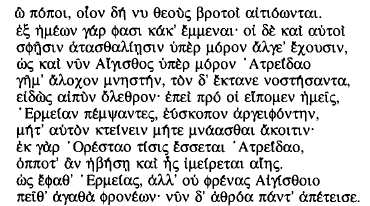
9 It is seen as representing a later stage of ethical thought in Jaeger, W., Paideia i, trans. Highet, G. (Oxford 1965) 143Google Scholar; Heubeck, A., Der Odyssee-Dichter und die Ilias (Erlangen 1954) 81–6Google Scholar; Dodds (n. 2) 32–3; Lloyd-Jones (n. 1) 28–9; for the most recent discussion see Friedrich, R., ‘The hybris of Odysseus’, JHS cxi (1991) 18–19.Google Scholar
10 ![]() Il. xi 695; xiii 634; xxii 418; Od. iii 207 = xvii 588; iv 693; vi 60; vii 166; xvi 86, 93; xviii 139, 143; xx 370; xxii 47, 314; xxiv 282, 352; cf. H.Ap. 67; H.Herm. 296; H. xv;
Il. xi 695; xiii 634; xxii 418; Od. iii 207 = xvii 588; iv 693; vi 60; vii 166; xvi 86, 93; xviii 139, 143; xx 370; xxii 47, 314; xxiv 282, 352; cf. H.Ap. 67; H.Herm. 296; H. xv; ![]() Od. xviii 57; xix 88.
Od. xviii 57; xix 88.
11 See Chantraine, P., Dictionnaire étymologique de la langue grecque (Paris 1968)Google Scholar, s.v. ![]()
12 Heubeck, A., West, S., Hainsworth, J.B., A Commentary on Homer's Odyssey i (Oxford 1988)Google Scholarad viii 166; cf. S. West ad i 7.
13 See ![]() Il. xi 695 (Nestor of the Epeans); cf. Od. iii 207; xvii 588; xx 370 (of the suitors); cf. also Hes. Op. 241;
Il. xi 695 (Nestor of the Epeans); cf. Od. iii 207; xvii 588; xx 370 (of the suitors); cf. also Hes. Op. 241; ![]() Od. xvi 86; xxiv 352 (of the suitors); cf. Hes. Op. 134;
Od. xvi 86; xxiv 352 (of the suitors); cf. Hes. Op. 134; ![]() Od xxiv 282 (of the suitors). The same holds good of the expression
Od xxiv 282 (of the suitors). The same holds good of the expression ![]()
![]() at Od. xii 300 (of Odysseus' companions) and xxiv 458 (of the suitors). It is only in post-Homeric Greek that atasthalie and its cognates invariably designate the extreme form of presumptuousness involving open impiety, see e.g. Hes. Op 134, 241, 261; Th.164, 209, 515, 996; fr. 30.16 M-W; Thgn. 736, 749; Hdt. ii 111.2; iii.49.2, 80.4; vii 34.2; viii 109.3; ix 78.2; 116.1, of the epitaph of Archedike, quoted by Thuc. vi 59.3. Cf. n. 56.
at Od. xii 300 (of Odysseus' companions) and xxiv 458 (of the suitors). It is only in post-Homeric Greek that atasthalie and its cognates invariably designate the extreme form of presumptuousness involving open impiety, see e.g. Hes. Op 134, 241, 261; Th.164, 209, 515, 996; fr. 30.16 M-W; Thgn. 736, 749; Hdt. ii 111.2; iii.49.2, 80.4; vii 34.2; viii 109.3; ix 78.2; 116.1, of the epitaph of Archedike, quoted by Thuc. vi 59.3. Cf. n. 56.
14 The verb ![]() frequently appears in this connection, see Il. xxii 103
frequently appears in this connection, see Il. xxii 103 ![]()
![]() (Hector of himself) = Od. ix 228 (Odysseus of himself). Cf. Od. ix 500
(Hector of himself) = Od. ix 228 (Odysseus of himself). Cf. Od. ix 500 ![]()
![]() (Odysseus of himself); Od. i 42–43
(Odysseus of himself); Od. i 42–43 ![]() Od. xxii 316
Od. xxii 316 ![]() (of the suitors; cf. also xxiv 458). Cf. also Il. iv 408–09.
(of the suitors; cf. also xxiv 458). Cf. also Il. iv 408–09.
15 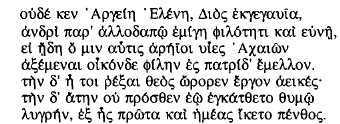
16 Cf. Od. iv 261–62, where Helen's behaviour is also explained as due to ate. Homer's characterization of Agamemnon's behaviour as deriving from ate is even more consistent: the state of ate is ascribed to Agamemnon no less than eleven times, more than to all the other named individuals taken together, see Adkins, A.W.H., ‘Values, goals, and emotions in the Iliad’, CP lxxvii (1982) 307 with n. 33.Google Scholar
17 Od. xii 372, cf. x 68.
18 See Dodds (n. 2) 19 n. 17; Doyle, R.E., ATH. Its use and meaning (New York 1984) 18Google Scholar; Verdenius, W.J., A commentary on Hesiod, Works and Days, vv. 1–382 (Leiden 1985) ad 215.Google Scholar
19 Il. ix 537 ![]() as Wyatt, F., Jr, ‘Homeric ATH’, AJP ciii (1982) 252Google Scholar, correctly emphasized, ‘Oineus’ ate brought on the Calydonian boar and the subsequent trouble between the Aetolians and the Couretes'.
as Wyatt, F., Jr, ‘Homeric ATH’, AJP ciii (1982) 252Google Scholar, correctly emphasized, ‘Oineus’ ate brought on the Calydonian boar and the subsequent trouble between the Aetolians and the Couretes'.
20 Il. xxiv 480–81. Note also that the lack of foreknowledge allows to understand how the word ate evolved after Homer to mean ‘unforeseen disaster’ on ate as ‘unforeseen disaster’ see Jaeger, W., ‘Solons Eunomie’, in Scripta minora i (Rome 1960) 319–24Google Scholar (first published in 1926).
21 See especially Il. iii 164–65, in which Priam absolves Helen from responsibility for the Trojan War, and Il. xix 270–74, Achilles absolving Agamemnon from responsibility for the Achaean defeat on similar grounds. Characteristically, the Odyssey treatment of Aegisthus' partner Clytemnestra in the phrase ![]() at xi 429 (cf. also iii 235, iv 91–2, xi 430 and 439) is in clear contrast to
at xi 429 (cf. also iii 235, iv 91–2, xi 430 and 439) is in clear contrast to ![]() a description of Helen at xxiii 222, in that while the former clearly presupposes a premeditated action the latter does not.
a description of Helen at xxiii 222, in that while the former clearly presupposes a premeditated action the latter does not.
22 It is true that Patroclus was advised by Achilles not to get close to the walls of Troy, cf. Heubeck (n. 9) 83. Yet Patroclus' case differs from those involving atasthalie in that, while the latter invariably emphasize the agent's disagreement with the advice rather than his being oblivious of it (see above, n. 14), Patroclus accepts Achilles' advice but later forgets it: ![]() (Il. xvi 686–87). This is why his mistake is ascribed to ate, see ibid. 685, 805.
(Il. xvi 686–87). This is why his mistake is ascribed to ate, see ibid. 685, 805.
23 ‘The word-order [of Od. i 7], genitive before possessive adjective, is quite abnormal; presumably this reflects the modification of a formulaic prototype like Il. iv 409’, S. West in Heubeck, S. West, Hainsworth (n. 12) ad locum; cf. Kirk, G.S., The Iliad: a commentary i (Cambridge 1985) ad iv 409.CrossRefGoogle Scholar
24 See Jones, D.M., Ethical themes in the plot of the Odyssey (London 1954) 9Google Scholar; H.W. Norheider in Lfrg E, s.v. ![]() Heubeck, A., Hoekstra, A., A commentary on Homer's Odyssey ii (Oxford 1989)Google Scholarad xii 320–3. Cf. Jaeger (n. 20) 322.
Heubeck, A., Hoekstra, A., A commentary on Homer's Odyssey ii (Oxford 1989)Google Scholarad xii 320–3. Cf. Jaeger (n. 20) 322.
25 According to Dodds (n. 2) 5, ‘the agents productive of ate, where they are specified, seem always to be supernatural beings’. The two Odyssey examples of ate as caused by wine (xi 61 and xxi 295–8) are treated by Dodds as a special case which does not disprove the rule, and he regards the ate produced in Dolon by Hector (Il. x 391) as ‘a symptom of Hector's own condition of (divinely inspired) ![]() ’, ibid. 19 n. 20, cf. Lloyd-Jones (n. 1) 23. However, as Doyle (n. 18) 21 n. 29, remarks, ‘the difficulty with this view is that
’, ibid. 19 n. 20, cf. Lloyd-Jones (n. 1) 23. However, as Doyle (n. 18) 21 n. 29, remarks, ‘the difficulty with this view is that ![]() is never ascribed to Hector’, cf. below, n. 40; moreover, Hector is actually described as producing ate in others in Il. xviii 311–13 as well, see further n. 37. In view of this, it seems safer to regard ate as being usually caused by an external factor, whether a god, or a fellow-man, or wine.
is never ascribed to Hector’, cf. below, n. 40; moreover, Hector is actually described as producing ate in others in Il. xviii 311–13 as well, see further n. 37. In view of this, it seems safer to regard ate as being usually caused by an external factor, whether a god, or a fellow-man, or wine.
26 Il. xi 695; Od. iii 207; xvi 93; xvii 588; xviii 143; xx 370; cf. Hes. Op. 241. Cf. also ![]() Od. iii 213; xvi 134;
Od. iii 213; xvi 134; ![]() xxi 375; Od. xx 394; xxii 432.
xxi 375; Od. xx 394; xxii 432.
27 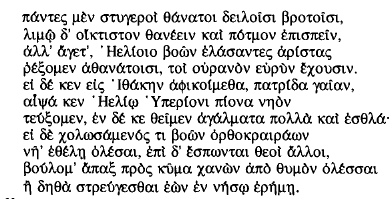
28 Dodds (n. 2) 1–18; Lloyd-Jones (n. 1) 8–24; Dihle, A., The theory of will in classical antiquity (Berkeley 1982) 20–47.Google Scholar Jaeger (n. 20) 319–24, seems to be the only one to have recognized that Homer makes provision both for errors that involve the lack of foreknowledge and for those that do not. However, he takes ate as an inclusive term comprising both kinds of error: to claim this is to ignore the fact that the Homeric vocabulary possesses a word for an error involving foreknowledge.
29 Gaskin(n. 1) 10–13.
30 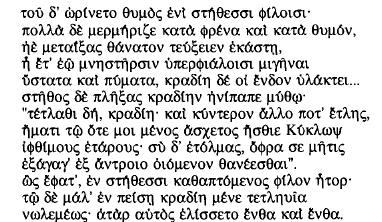
31 It is irrelevant whether the object of the interaction is man's thumos proper or his heart ![]() when appearing in the psychological (rather than physiological) context these words are employed as functional synonyms which can easily replace each other in accordance with the given metrical conditions. See further Jahn, Th., Zum Wortfeld ‘Seele-Geist’ in der Sprache Homers (München 1987) 182–94, 293–98.Google Scholar
when appearing in the psychological (rather than physiological) context these words are employed as functional synonyms which can easily replace each other in accordance with the given metrical conditions. See further Jahn, Th., Zum Wortfeld ‘Seele-Geist’ in der Sprache Homers (München 1987) 182–94, 293–98.Google Scholar
32 

33 For the most part in Iliad ix, see ![]() vv. 255–56, Odysseus to Achilles;
vv. 255–56, Odysseus to Achilles; ![]() v. 495, Phoenix to Achilles;
v. 495, Phoenix to Achilles; ![]()
![]() 635–37, Ajax to Achilles, cf. also vv. 462–63. Characteristically, the expression ‘to yield to one's thumos’ also appears mainly in this book, see
635–37, Ajax to Achilles, cf. also vv. 462–63. Characteristically, the expression ‘to yield to one's thumos’ also appears mainly in this book, see ![]() 109–10, of Agamemnon;
109–10, of Agamemnon; ![]() v. 598, of Meleager; cf. xxiv 42–43; Od. v 126.
v. 598, of Meleager; cf. xxiv 42–43; Od. v 126.
34 Cf. Griffin, J., Homer on life and death (Oxford 1980) 73–76Google Scholar, Lloyd-Jones (n. 1) 23, takes Achilles' mentioning of ἄται in his speech addressed to Agamemnon after their reconciliation (Il. xix 270) as meaning that both Agamemnon and Achilles acted under the influence of ate, but 1 agree with Adkins (n. 16) 308, that the passage should be taken as relating to Agamemnon alone. Il.. ix 510–12, where Phoenix seems to threaten Achilles with ate unless he accepts Agamemnon's gifts, seems to be more relevant in this connection. Yet, contrary to what Wyatt (n. 19) 256, contends, this theme is not developed further; see Edwards, M.W., The Iliad: a commentary v (Cambridge 1991) ad xix 270–5.CrossRefGoogle Scholar
35 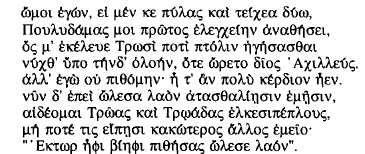
36 Il. xii 195–264; xiii 723–757; xviii 243–315. In Iliad xii, before the attack against the Achaean camp, Polydamas interprets an omen to the effect that it would be unwise to proceed with the attack. Hector disagrees, abuses Polydamas, boasts that he is under the protection of Zeus (which is true for the time being), and leads the troops. In the last analysis Polydamas is of course right, because this is the very action that will eventually bring on the Trojan disaster; but the attack in question is a success, and no judgement is passed on Hector's behaviour at the moment. In Iliad xiii Polydamas interferes again with Hector's leading the campaign. This time he is much more specific: Hector is incapable of being persuaded by advice (![]() v. 726); being an excellent warrior, he claims to excel all men in counsel as well; but the gods are not in the habit of granting all their gifts to one person. The characteristic features of atasthalie are already present in this rebuke; but this time Hector follows Polydamas' advice to summon the council and to discuss the plan of action, and the theme is dropped, only to emerge again in Iliad xviii. For the analysis of these books in the light of Hector's error see Redfield, J.M., Nature and culture in the Iliad (Chicago 1975) 143–53Google Scholar; Schofield, M., ‘Euboulia in the Iliad’, CQ xxxvi (1986) 18–22.Google Scholar
v. 726); being an excellent warrior, he claims to excel all men in counsel as well; but the gods are not in the habit of granting all their gifts to one person. The characteristic features of atasthalie are already present in this rebuke; but this time Hector follows Polydamas' advice to summon the council and to discuss the plan of action, and the theme is dropped, only to emerge again in Iliad xviii. For the analysis of these books in the light of Hector's error see Redfield, J.M., Nature and culture in the Iliad (Chicago 1975) 143–53Google Scholar; Schofield, M., ‘Euboulia in the Iliad’, CQ xxxvi (1986) 18–22.Google Scholar
37 Il. 18.311–13 ![]()
![]()
38 That putting ate into the heart and taking away the understanding are events of the same order has been shown by Dodds (n. 2) 2–4.
39 Cf. above, n. 26. Note that at Od. iii 213 ![]() is a varia lectio of
is a varia lectio of ![]() Note also that the error of Odysseus' companions is described at Od. xii 373 by means of the same verb
Note also that the error of Odysseus' companions is described at Od. xii 373 by means of the same verb ![]()
![]() that a similar language is used for describing Clytemnestra's crime at Od. xi 429
that a similar language is used for describing Clytemnestra's crime at Od. xi 429 ![]()
![]() and that the verb
and that the verb ![]() can take
can take ![]() as a direct object, see Il. xx 153–54, cf. vii 45.
as a direct object, see Il. xx 153–54, cf. vii 45.
40 Note that in his reply to Polydamas Hector not only adduces arguments which are meant to counterbalance Polydamas' advice but also envisages the possibility of his single combat with Achilles, see Il. xviii 284–309 and Edwards (n. 34) ad locum.
41 Cf. Dawe, R.D., ‘Some reflections on ate and hamartia’, HSCP lxxii (1967) 99Google Scholar: ‘those who … believe in an ate-stricken Hector will find nothing in Homer's actual language to support them’.
42 ![]()
![]() Cf. Gaskin (n. 1) 12–13.
Cf. Gaskin (n. 1) 12–13.
43 There is reason to suppose that of the three patterns of error akrasia is the latest. First, the only Homeric formula in which man's interaction with his thumos is cast, ![]() ( Il. xi 403; xvii 90; xviii 5; xx 343; xxi 53, 552; xxii 98; Od. v 298, 355, 407, 464), could only have been created after the disappearance of the digamma, see Hoekstra, A., Homeric modifications of formulaic prototypes (Amsterdam 1965) 68–70.Google Scholar Second, as distinct from the expressions involving ate and atasthalie, those rendering the idea of restraining one's thumos are for the most part individual expressions: in fact, the only formula that can be taken into account in this connection seems to be
( Il. xi 403; xvii 90; xviii 5; xx 343; xxi 53, 552; xxii 98; Od. v 298, 355, 407, 464), could only have been created after the disappearance of the digamma, see Hoekstra, A., Homeric modifications of formulaic prototypes (Amsterdam 1965) 68–70.Google Scholar Second, as distinct from the expressions involving ate and atasthalie, those rendering the idea of restraining one's thumos are for the most part individual expressions: in fact, the only formula that can be taken into account in this connection seems to be ![]() (Il. 462; xiii 280); on the distinction between formulaic and individual expressions see e.g. Finkelberg, M., ‘Formulaic and nonformulaic elements in Homer’, CP lxxxiv (1989) 179–97.Google Scholar Third, the larger part of these expressions is concentrated in the problematic Book ix of the Iliad (see above, n. 33). Finally, the very fact that man's inability to restrain his thumos has no term of its own seems to indicate that what is dealt with here is a developing concept.
(Il. 462; xiii 280); on the distinction between formulaic and individual expressions see e.g. Finkelberg, M., ‘Formulaic and nonformulaic elements in Homer’, CP lxxxiv (1989) 179–97.Google Scholar Third, the larger part of these expressions is concentrated in the problematic Book ix of the Iliad (see above, n. 33). Finally, the very fact that man's inability to restrain his thumos has no term of its own seems to indicate that what is dealt with here is a developing concept.
44 Teiresias' instructions to Odysseus in the Nekyia contain what seems to be an interpretation of the Thrinacia episode in the vein of akrasia: ![]()
![]() Od. xi 104–05. In the rest of the Odyssey the same episode is interpreted through the atasthalie of Odysseus' companions and the ate of Odysseus himself.
Od. xi 104–05. In the rest of the Odyssey the same episode is interpreted through the atasthalie of Odysseus' companions and the ate of Odysseus himself.
45 Dodds (n. 2) 32–33; Lloyd-Jones (n. 1) 29.
46 Cf. Rutherford, R.B., ‘The philosophy of the Odyssey’, JHS cvi (1986) 150–51Google Scholar; S. West in Heubeck, West, Hainsworth (n. 12) ad i 7. According to Friedrich (n. 9) 27, this episode fulfils Zeus' words in the prologue in that Odysseus is punished by Zeus for his hubris on the Cyclops island. This is to misunderstand the message of Zeus' theodicy; had Zeus simply meant that mortals are punished by the gods for their misdoings there would have been nothing unusual about this theodicy. What Zeus does mean and what is being carried out throughout the poem is the idea that there are errors committed ![]() that is, not in accordance with the divine design—of these errors, mortals are the only authors.
that is, not in accordance with the divine design—of these errors, mortals are the only authors.
47 Eth.Nic. 1110a1–1112a17; cf. Rhet. 1373b25–38; 1374b1–9.
48 Eth.Nic. ![]()
49 According to Burnet, J., The ethics of Aristotle (London 1900) 109Google Scholar, ‘this [i.e. will] is after all the best rendering of the word’; according to Dihle (n. 28) 57, ‘one other detail in Aristotle's moral and psychological doctrines could have led to the concept of will as isolated from both instinct and reason’.
50 The most typical Homeric example of the latter is the consideration of possible alternatives leading to a reasoned decision as, for example, in Odysseus' soliloquies in Od. v 408–23 and 465–73, adduced in Dihle (n. 28) 191 n. 33. Dihle comments on them as follows: ‘In both cases, Homer describes in great detail what goes on in the mind of Odysseus before he makes the choice of the means and ends of the action required in the given situation—without using, of course, the word ![]() ’.
’.
51 See Bumet (n. 49) 108–09; Dover (n. 4) 146–54; Dihle (n. 28) 185 n. 85. The following pasage of Hippias Minor seems to be especially illuminating in this connection: ‘And how, Socrates, can those who intentionally err, and voluntarily and designedly commit iniquities ![]()
![]() be better than those who err and do wrong involuntarily
be better than those who err and do wrong involuntarily ![]() Surely there is a great excuse
Surely there is a great excuse ![]() to be made for a man telling a falsehood or doing an injury or any sort of harm to another, in ignorance
to be made for a man telling a falsehood or doing an injury or any sort of harm to another, in ignorance ![]() And the laws are obviously far more severe on those who lie or do evil, voluntarily
And the laws are obviously far more severe on those who lie or do evil, voluntarily ![]() than on those who do evil involuntarily
than on those who do evil involuntarily ![]() ’ (371e9–372a5); tr. B. Jowett.
’ (371e9–372a5); tr. B. Jowett.
52 Od. xi 61; xxi 295–98; Eth.Nic. 1113b30–33.
53 See Eth.Nic. 1111a8–21.
54 Eth.Nic. 1135b11–1136a9; Aristotle's terms are given in D. Ross's translation.
55 See Dodds (n. 2) 5–6; Adkins (n. 16) 324–26 and Merit and responsibility (Oxford 1960) 50–1.
56 Heracles of H.Hom, xv should also be added to the list of heroes whose atasthalie cannot be easily measured by moral or religious standards, see ![]() at v. 6. Cf. also
at v. 6. Cf. also ![]() at H.Del Ap. 67.
at H.Del Ap. 67.
57 Note at the same time that the terms in which Sophocles treats Oedipus' involuntary error in the lyrics of Oedipus at Colonus do not differ essentially from those of Homer, see esp. 525–26 ![]()
![]()
58 After emerging on a number of occasions in early Greek poetry and prose (see above, n. 13), atasthalie disappears so completely that it is even quoted in Aristotle's Rhetoric as an example of a ‘strange’ word, see Rhet. 1406a9. It is not until the second century AD that the word emerges again, see Luc. Astr. xx, cf. Cont. iii; Arr. An. vii 14.5, cf. vi 27.4; Ind. xiii 13.
59 This is not to say that classical Greek did not possess a morally neutral term for error: hamartia with its cognates was just such a term. See Dover (n. 4) 152: ‘it was possible to distinguish between error (hamartiā, hamartēma, verb hamartanein or exhamartanein) on the one hand and crime, wrong-doing (adikiā, adikēma, verb adikein), sin or impiety (asebeiā, asebēma, verb asebein) on the other’. At the same time, hamartia was used as an inclusive term for human error both in the sense that ‘not all errors are crimes or sins, but any crime or sin can be called “error” in Greek (ibid.) and in that it is ‘something which can be either entirely the responsibility of the man who makes it, or can be something induced, normally by the gods’, Dawe (n. 40) 94. This can be the reason why hamartia was chosen by Aristotle in the Poetics for designating the tragic hero's error.
- 3
- Cited by




